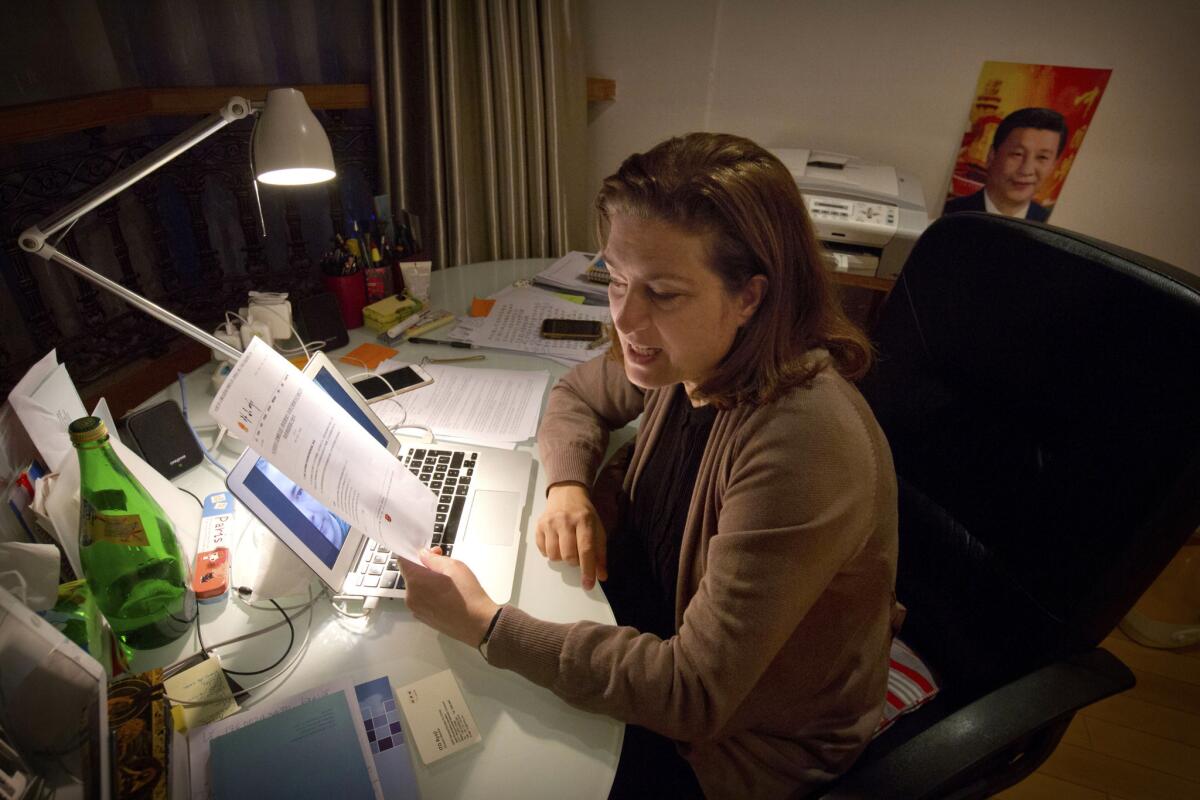China will boot French journalist for article criticizing ruling party

French journalist Ursula Gauthier holds a statement criticizing her from the Chinese Ministry of Foreign Affairs.
- Share via
reporting from Beijing — China will expel a French journalist for writing an article that criticized the ruling Communist party’s policies in the ethnically riven northwestern area Xinjiang, marking the country’s first expulsion of a foreign correspondent since 2012.
Ursula Gauthier, a Beijing correspondent for the Paris-based weekly L’Obs, said that a representative from China’s foreign ministry told her that her press credentials would not be renewed for 2016 unless she publicly apologizes for the November article, which questioned Beijing’s insistence that violent attacks in the region are closely linked with global terrorism.
See more of our top stories on Facebook >>
The denial of a correspondent’s press credentials — which are necessary for a visa renewal — amounts to a form of expulsion. Gauthier has refused to apologize, and plans to leave China by Thursday, when her press card expires.
China’s foreign ministry spokesman Lu Kang said in a written statement Saturday that Gauthier had voiced support for “terrorist activities” and so “is not suited to continue working in China.”
“I’m really angry. Really,” Gauthier said in a phone interview Saturday. “If it was true that I was supporting terrorism, they should indict me, not expel me; it’s a crime.”
She characterized the allegations against her as slander.
China has not expelled a correspondent since 2012, when authorities refused to extend press credentials for Melissa Chan, a journalist for Al Jazeera, after she reported on sensitive topics such as illegal land seizures and the extralegal detention of petitioners.
Gauthier’s article, published on Nov. 18 after the Paris terror attacks — called “after the attacks, Chinese solidarity is not without ulterior motives” — accused the Chinese government of stirring resentment in Xinjiang, the site of several recent violent clashes between ethnic Uighurs and majority Han Chinese. She wrote that a recent violent attack on a coal mine in the area was “probably in revenge for an abuse, an injustice or an expropriation.”
Authorities in Xinjiang maintain draconian religious, political and cultural constraints over Uighurs — a predominantly Muslim, Turkic-speaking people — including heavy surveillance and bans on certain forms of Islamic dress. Beijing denies any repression in the region, and blames violent attacks on “terrorism” and “extremism” imported from abroad.
The region’s heavy security presence often precludes journalists from accessing the scenes of these attacks, making independent reporting nearly impossible.
Many other observers — including academics, activists and foreign correspondents — have argued that the region’s violent attacks are a result of heavy-handed government policies.
Gauthier said that the foreign ministry will not give her new press credentials unless she publicly apologizes for “hurting Chinese people’s feelings,” states that she does not “support terrorism,” and distances herself from “foreign NGOs and media who presented my case as an infringement of press freedom in China.”
In November, following the article, the state-controlled Global Times and China Daily newspapers ran scathing editorials accusing Gauthier of “bias.”
“She forgets that people all over the world have the same right to protect themselves from being killed for no reason,” wrote the China Daily. “For her, it is evil to kill civilians in France, while it is ‘understandable’ to kill civilians in China. She uses a different yardstick when terrorists kill innocent civilians in China.”
The editorials racked up thousands of comments, some of which made violent threats against Gauthier and published her picture and address.
The Foreign Correspondents’ Club of China decried the government’s action against Gauthier. “Receiving criticism is a normal and necessary part of journalistic work, but this is neither proportionate nor reasonable,” the group said in a statement. “Insinuating that Ms. Gauthier supports terrorism is a particularly egregious personal and professional affront with no basis in fact.”
The group added, “Unless the authorities reverse their decision this will be the first expulsion of a foreign correspondent from China since 2012. It is one of the most flagrant attempts, amongst many, to use the accreditation and visa process to threaten journalists.”
Gauthier said her chief editor had written the Chinese Embassy in Paris and that she had written a long letter in which she refuted the characterization of her article, to no avail.
“I wrote them a very long letter explaining that I never said those offending things that Global Times said that I said. I did the maximum I could do. I cannot say, ‘You were right, that I said I support terrorism.’ I cannot say that. They want me to say that publicly. How is it possible? They know it is not possible so there is no room for negotiation.”
Gauthier said she wasn’t sure why the editor of the Global Times and the Foreign Ministry had singled her out so forcefully. But she felt that once the paper began its campaign against her, “it was already too late for the Foreign Ministry to back down. It was impossible to back down after that.”
ALSO
Even for the active, a long sit shortens life and erodes health
Man sought after Pomona woman is doused with gasoline, set on fire
UC system divests $30 million in prison holdings amid student pressure
More to Read
Sign up for Essential California
The most important California stories and recommendations in your inbox every morning.
You may occasionally receive promotional content from the Los Angeles Times.











